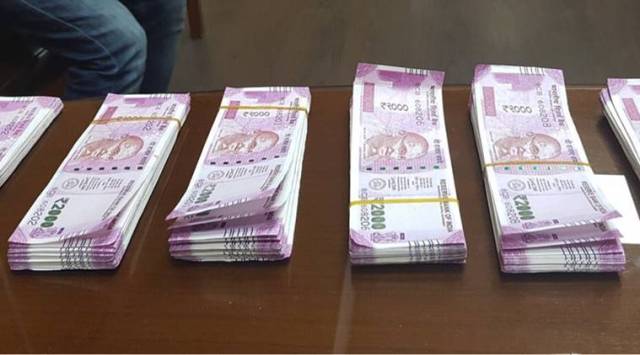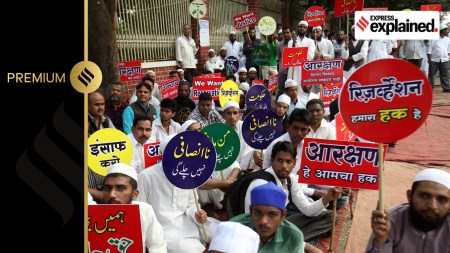- India
- International
RBI withdraws Rs 2,000 notes from circulation, asks all to exchange or deposit them by Sept 30
Exchange of currency allowed from May 23; limit of Rs 20, 000 at a time
 RBI has decided to withdraw the Rs 2,000 note from circulation. (Representational)
RBI has decided to withdraw the Rs 2,000 note from circulation. (Representational)
THE RESERVE Bank of India (RBI) Friday announced the withdrawal of its highest value currency note, Rs 2,000, from circulation, adding that the notes will continue to be legal tender. It said the existing Rs 2,000 notes can be deposited or exchanged in banks until September 30, but set a limit of “Rs 20,000 at a time”.
The central bank advised the public to deposit Rs 2,000 notes — introduced during demonetisation in November 2016, when Rs 500 and Rs 1,000 notes were withdrawn — into their bank accounts and/ or exchange them into notes of other denominations at any bank branch. It also advised banks to stop issuing Rs 2,000 notes with immediate effect.
“In order to ensure operational convenience and to avoid disruption of regular activities of bank branches, exchange of Rs 2,000 banknotes can be made up to a limit of Rs 20,000 at a time, at any bank starting from May 23,” it said.
“To complete the exercise in a time-bound manner and to provide adequate time to the members of public, all banks shall provide deposit and/ or exchange facility for Rs 2,000 banknotes until September 30, 2023,” it said.
“Deposit into bank accounts can be made in the usual manner, that is, without restrictions and subject to extant instructions and other applicable statutory provisions,” the RBI said.

The facility for exchange of Rs 2,000 notes, up to the limit of Rs 20,000 at a time, will also be provided at the 19 regional offices of the RBI having issue departments from May 23.
An hour after the announcement, when contacted by The Indian Express, a top official in the Reserve Bank of India said: “This is a routine exercise and a similar withdrawal of currency notes which had been printed before 2005 was done by the Government in 2013-2014. So nothing more should be read into this move this time around too. This is what other countries, including the United States do from time to time.”
Asked why, the RBI official attributed the move to several reasons. “One, there was the issue of soiled Rs 2,000 notes lying with the RBI. The other was that Rs 2,000 notes are not popular and they are just lying around. They have run their life cycle. Even at the peak of their being in circulation, they did not comprise much of the currency in circulation and, at present, are only 10%-11% of the total currency. When the demonetization of Rs 500 and Rs 1000 notes was done in 2016, they comprised 80% of the total currency in circulation. So there is a huge difference.”
Asked if the Finance Ministry had been consulted, the official said: “Such a decision would not be made by the RBI alone.”
According to the RBI, about 89 per cent of the Rs 2,000 denomination notes were issued prior to March 2017 and are at the end of their estimated life span of four-five years. “The total value of these banknotes in circulation has declined from Rs 6.73 lakh crore at its peak as on March 31, 2018 (37.3% of notes in circulation) to Rs 3.62 lakh crore constituting only 10.8% of notes in circulation on March 31, 2023,” it said.
The RBI had undertaken a similar withdrawal of notes from circulation in 2013-2014.
RBI decides to withdraw ₹2000 denomination banknotes from circulation, will continue as legal tender pic.twitter.com/Lc9ejtcSIX
— Aanchal Magazine (@AanchalMagazine) May 19, 2023
The Rs 2,000 note was introduced in November 2016 under Section 24(1) of RBI Act, 1934, primarily to meet the currency requirement of the economy in an expeditious manner after the withdrawal of legal tender status of all Rs 500 and Rs 1,000 notes in circulation at that time.
“The objective of introducing Rs 2,000 banknotes was met once banknotes in other denominations became available in adequate quantities. Therefore, printing of Rs 2,000 banknotes was stopped in 2018-19,” the RBI said, adding that “it has also been observed that this denomination is not commonly used for transactions” and “the stock of banknotes in other denominations continues to be adequate to meet the currency requirement of the public”.
May 24: Latest News
- 01
- 02
- 03
- 04
- 05






































